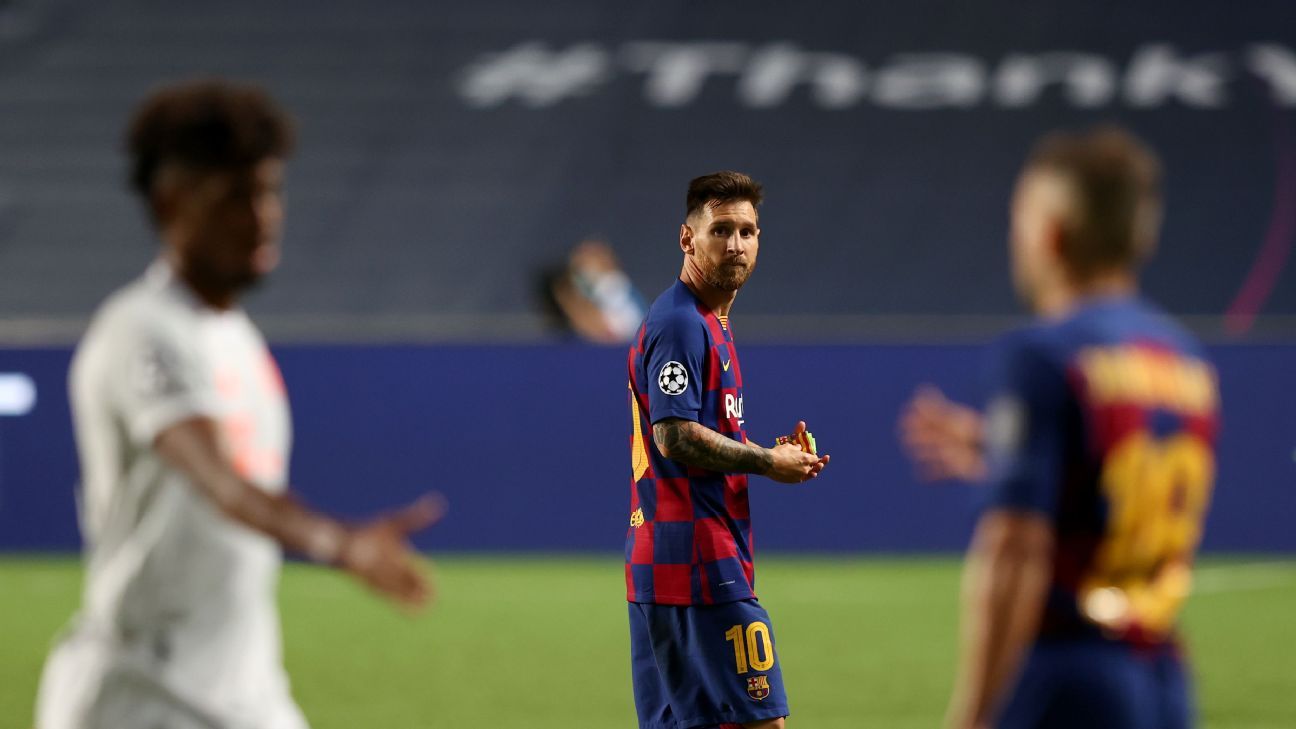Every big club in the world would want Lionel Messi. Some players are just too good, and too exciting, to turn down if the opportunity arises that they may become available. There is just one major problem with Messi, though. Or, to be more precise, 100 million of them.
Whenever you find yourself in the company of a senior executive at one of football’s super clubs, conversation always turns to Messi and the fantasy question of whether they would attempt to sign the Barcelona captain if he ever decided to leave the Camp Nou. One such figure laughed late last year when asked about his club’s Messi prospects. “We would all love Messi,” the executive said. “But he earns £100 million a year at Barcelona, so he would have to take a pretty big pay cut if he ever left.”
– Lowe: Bad blood and ‘burofax’ between Messi, Barca
– Hunter: Why Barcelona should let Messi go
– Connelly: How would Barca look without Messi?
For all of Messi’s incredible talents, his earning power is the one thing that can overshadow his ability with the ball at his feet if he really does want to leave Barcelona this summer.
Even in normal times, paying a player half of Messi’s current salary would be a challenge for every big club that would rate their chances of signing him. But in 2020, with football clubs seeing their cash flow hit hard by the impact of the COVID-19 pandemic, the Messi numbers simply don’t add up, even for the likes of Manchester City, Paris Saint-Germain, Bayern Munich and Manchester United.
Man City would seem the obvious destination due to the club’s Barcelona connection with manager Pep Guardiola, chief executive Ferran Soriano and director of football, Txiki Begiristain, but having just avoided a two-year Champions League ban after overturning a UEFA sanction for breaching Financial Fair Play regulations, the club’s accounts will be under such close scrutiny that they will find it virtually impossible to fund a move for Messi.
There might be a way of making it work; say, the securing of a sponsor prepared to pay whatever it takes to be associated with the club that signs Messi. It would be difficult for UEFA, or anybody else, to argue that even a £100m annual sponsorship was inflated, because there’s simply nothing to measure it against.
Meanwhile, sources have told ESPN that United are losing between £4-5m every time a game is staged without paying supporters at Old Trafford during the COVID-19 crisis. Their Premier League rivals will be suffering a similar shortfall and with all top flight clubs in England due to pay a rebate of approximately £20m to the league’s broadcasters, for big clubs like United and City, they will soon by counting lost match-day revenue in the region of £50m. That is a big financial hole for any business to contend with, and the losses will not be restricted to the money that comes through the turnstiles and from the television companies.
All of Europe’s major clubs are having to cut their cloth accordingly this summer. Some will argue that Chelsea are breaking the mould with their business so far on Hakim Ziyech and Timo Werner, but having been unable to spend the €100m raised by Eden Hazard’s move to Real Madrid last year as a result of a worldwide transfer ban, the Stamford Bridge side are merely using money that has been sat in a bank vault for the past 12 months. Nobody else has made a big splash in the transfer market, and much of that is down to many within the game believing that football has still to accept the financial correction that is heading its way.
So if Messi really is making himself open to offers, either as a free agent via a contractual option or as a player commanding a transfer fee — his release clause is understood to be 700 million euros — he could not have picked a worse time to seek a move away from Barcelona.
Had Messi been 27 and at the peak of his powers, some club may have taken the view that the Argentine was worth the huge outlay. Crunching the numbers for a 27-year-old with plenty of years ahead of him is a different story to trying to make it work for a 33-year-old.
As Cristiano Ronaldo (35) and Zlatan Ibrahimovic (38) have shown, and continue to do so, greatness does not have a use-by date and Messi would certainly give any new club a massive injection of star quality and match-winning ability. But at 33, there would be no resale value with Messi and the clock would be ticking on him delivering success and silverware. And as for shirt sales paying his wages, all clubs have long since realised that that particular myth does not correspond with reality.
– Stream LIVE games, replays on ESPN+
– Don’t have ESPN? Get instant access
The biggest earner for the super clubs is, and always has been, success on the pitch, and even Messi cannot guarantee that. Barcelona won nothing last season and they have not won the Champions League since 2015. And let’s not forget that Messi could not prevent the Champions League meltdown in Rome in 2018, the semifinal collapse at Liverpool in 2019 and their 8-2 defeat at the hands of Bayern in Lisbon.
So when everything is considered, it’s difficult to make a sound, financial case for signing Messi from Barcelona this summer. Unless, of course, he decides that he is so determined to find a new challenge that he is prepared to accept just a tenth of what he earns right now.
If that happens, then Messi would jump to the top of every club’s summer hit-list. But don’t expect that anytime soon. Right now, he is a £100m-a-year player before a transfer fee has even been discussed, so good luck finding a club willing and able to make a deal happen.
